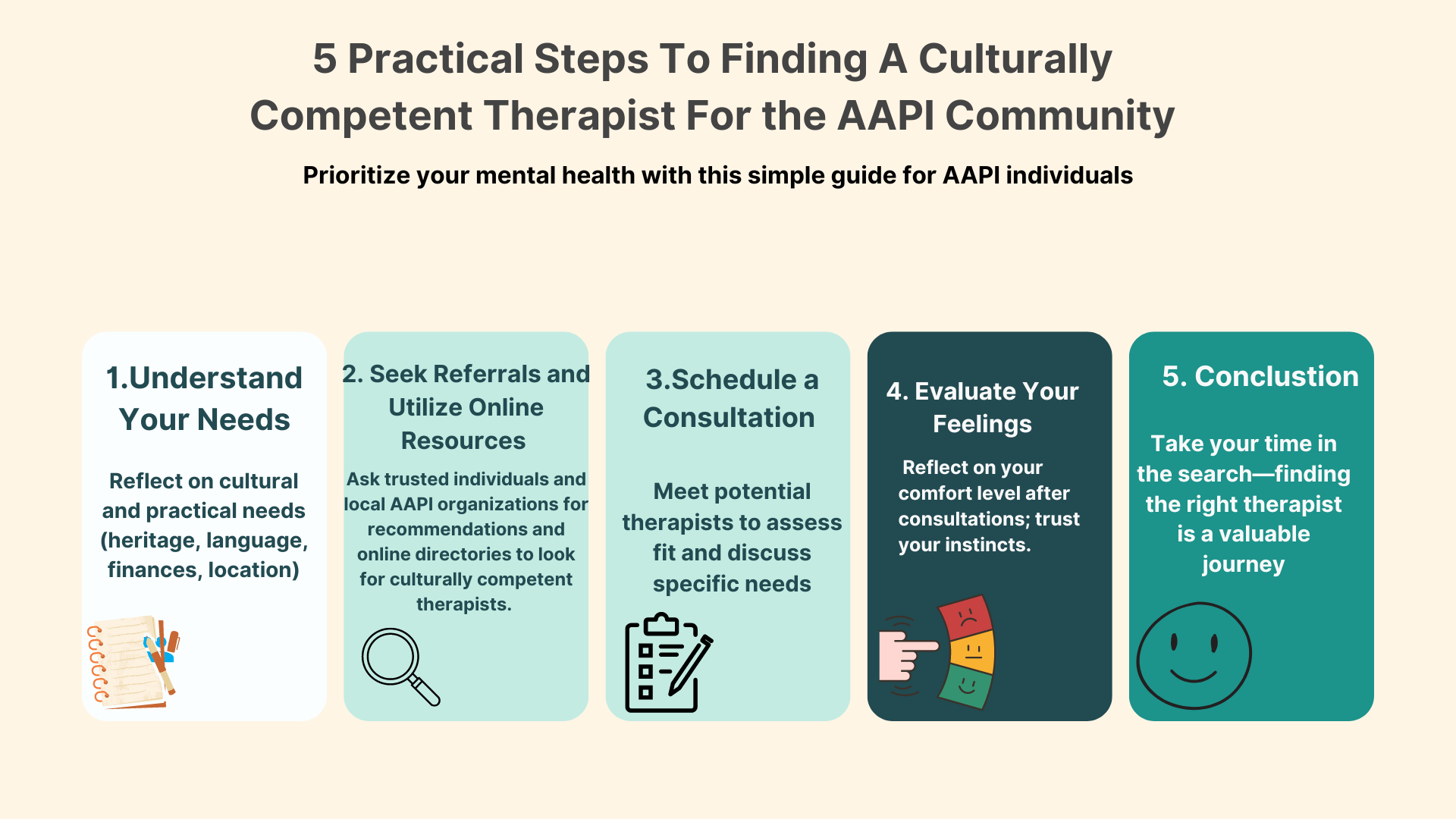5 Practical Steps To Finding A Culturally Competent Therapist For the AAPI Community
Are you ready to dive into the journey of finding a therapist who resonates with your culture? Let’s dive in with this guide so you can start your journey.
Prioritizing your mental health is a courageous step, especially in the AAPI community, where cultural understanding is vital in therapy. I hope this step-by-step guide proves to be helpful to you as you navigate your search for a culturally competent therapist.
Are you taking the first step toward mental wellness? Here’s a visual step-by-step guide to finding a culturally competent therapist who fits your needs.
Understand Your Needs
Take a moment to reflect on your cultural and practical needs. These questions can help streamline your search and ensure you have the right fit. Consider the following guiding questions:
Cultural Considerations:
Are you looking for a therapist who shares your heritage?
What are your language needs?
Would you like a therapist who speaks and understands your heritage language?
Are there any specific topics you’d like them to address specifically?
Practical Considerations:
What are your financial options for therapy?
Does your health insurance cover your prospective therapist?
Do you need to consider alternatives such as community resources or sliding scale fees?
What’s your location preference: in-person sessions or virtual ones?
Are their hours flexible enough to accommodate your schedule?
2. Seek Referrals and Use Online Resources
Beginning your search for a culturally competent therapist can seem daunting. The uncertainty can leave you staring at the blinking cursor on the Google search bar. The best place to start your search is by asking people you trust or local AAPI organizations for referrals and utilizing online resources.
Consult Your Primary Care Physician
If you have access to a primary care physician (PCP), call or message them and ask if they can refer you to a culturally competent therapist.
Local AAPI Organizations:
Reach out to local organizations near you that focus on AAPI communities. Many of these organizations have networks with culturally competent local mental health resources that can provide tailored recommendations.
The following resources are some of the many that serve the Boston AAPI community:
Asian Community Development Corporation (ACDC)
South Cove Community Health Center South Cove Community Health Center
Boston Chinatown Neighborhood Center (BCNC)
Dear Therapy Community Resources: A comprehensive list of more Boston-based AAPI community organizations
Utilize Online Resources:
To broaden your search, use online directories featuring therapists emphasizing cultural competence.
Asian Mental Health Collective: This organization provides a directory of therapists who understand the cultural nuances of AAPI communities. You can filter by specialty and location.
Psychology Today: Their “Find a Therapist” tool allows you to search for therapists based on various criteria, including insurance, client populations they serve, and languages they speak.
Inclusive Therapists: This directory prioritizes therapists focusing on inclusivity and diversity. You can find practitioners who are culturally aware and align with your specific needs.
Center for Behavioral Health and Wellness (Boston): If you're in Boston, this center provides specialized mental health services for the AAPI community. They often have therapists who are culturally competent and understand the unique challenges faced by AAPI individuals.
For AAPI College Students
If you're a college student, take advantage of the campus resources you're paying for. Most colleges have counseling services with culturally competent staff. If they don't, please ask about local AAPI organizations with mental resources that can be tailored for you.
3. Schedule a Consultation
Most therapists offer brief consultations (up to 30 minutes) to assess your fit. Use this opportunity to ask essential questions:
What’s your experience with the AAPI population?
Are you familiar with the specific needs I identified in my reflection?
How do you measure progress?
How will the first few sessions go?
4. Evaluate Your Feelings
After the consultation, take time to reflect on your experience:
How did it make you feel?
Do you feel comfortable with this therapist?
Please know that if you’re unsure, it’s okay as well! Finding the right therapist will take time.
5. Conclusion
I hope this guide has helped you get a clearer picture of searching for a culturally competent therapist. It seems like a long process, but it’s well worth the effort when you find the right fit. Reflecting on what you need and asking the right questions will go a long way in this process and make a big difference.
Remember that finding the right therapist isn’t a race, and it’s perfectly fine to take your time. Keep looking until you find the right fit - I’m rooting for you.
We’d love to hear your thoughts. In your opinion, what additional resources or tips are most helpful for those seeking therapy?


